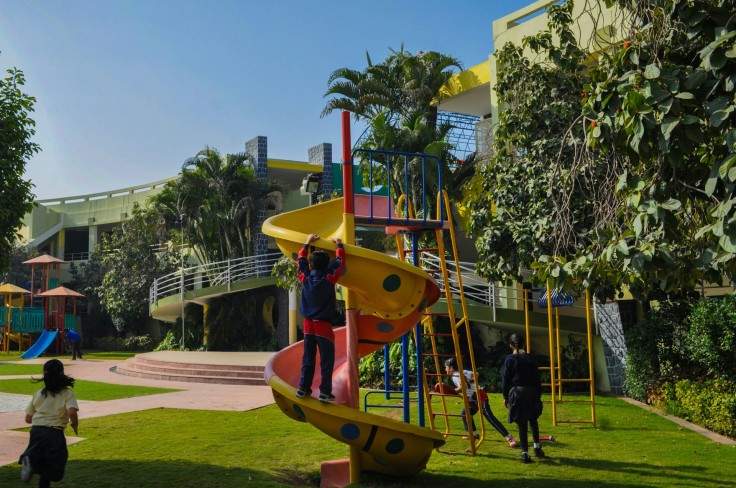Children attend school and daycare to engage with others, develop life skills, and, above all, to learn. While schools and daycares may be well-versed in how to run a classroom, there may not be as much attention on what occurs during recess or playtime. However, outdoor play significantly boosts a child's capacity for learning. Below are the top cognitive, as well as social and emotional, benefits of outdoor play.
Cognitive Benefits
Learning is a core component of the school day, but that doesn't mean it necessarily needs to happen within a classroom. Outdoor play can blend fun with education. The natural world becomes a classroom, a place where children can be themselves, expend energy, and interact with those around them. Here are a few ways that getting children outside during the day can foster cognitive learning.
Hands-On Learning and Exploration
There are so many things to take in within the natural world. There are plants to touch, bugs to watch, and playground equipment to climb on. While indoor learning is necessary for many lessons, outdoor learning lends itself to more hands-on exploration and engagement. Children become curious about what they see and smell. They use twigs and leaves to build mini art projects, play with sand to construct walls and castles, and find other natural elements that spark inquiry.
Hands-on learning is important because it fosters deeper understanding and awareness. When a child can physically see and touch a growing flower, they are more likely to grasp the concept of photosynthesis. This can lead to increased retention, so information sticks longer.
Creativity and Imagination
Children are the best dreamers. They come up with the most magical, fantastical scenarios for pretend play. They envision new ways to play games, assembling different roles for their friends and creating a new game altogether. Creativity and imagination truly thrive when children are brought outdoors. They feel the freedom of being in the open space, allowing their imaginations to run wild.
Engaging in a creative thought process will help children as they mature. Creative thinking can help them solve problems during school, addressing and finding solutions in new ways. It can also help improve memory and concentration, and is known to help with listening skills as well.
Problem-Solving and Decision-Making
Outdoor play is a great opportunity for children to learn problem-solving and decision-making skills on their own. When playing on the playground, they must find out how to best cross the rope ladder swing to get to the other side. They learn how to work together as a team to achieve a common goal, such as building a big sand castle fortress. During a scavenger hunt, they learn together as they compete against each other to find clues the fastest and solve the puzzle.
The earlier that children can make decisions on their own and navigate through different problems, the better. They will continue to hone in on these skills as they grow, learning how to work together with others in the classroom during school projects, and eventually working as a team in an office setting.
Social and Emotional Benefits
In addition to cognitive benefits, outdoor play also provides social and emotional benefits. In the classroom, there tend not to be as many ways for groupthink. Space limitations are one thing, but children may also be given specific desks, making it more of a challenge for a teacher to separate deskmates during partner work. However, during outside time, children can play freely with their friends, whether they are in their same class or another one. Below are a few of the social and emotional benefits that occur during outdoor play.
Social Skills
Learning that "sharing is caring" is often first learned on the playground. Children pick up social skills by interacting and playing together with their peers. They come to understand that it's unfair for them to hog the swingset during the entire recess block, or that everyone needs a fair share of time on the merry-go-round spinner. These learnings mean being openly communicative with others, letting them know what they would like to do, and listening in response to others' wishes.
Other social skills that are learned during outdoor play include collaboration, conflict resolution, and responsibility. Children must collaborate if they're on the same Capture the Flag team to score against the other team. They need to address conflicts if someone becomes upset or feels left out during play. And, they must take responsibility if someone accidentally falls because another child was in the way, or if they skip the line to take a turn on the slide.
Mental Health
Nature has a calming effect on the body. Getting outside during the middle of the day can be a great way for children to release stress and anxiety. They may feel pressure during school if they aren't grasping a certain concept, or maybe they are having interpersonal struggles with those in the classroom. Getting outside is a chance for all children in the school or daycare to reset and come back feeling more ready and prepared to take on the rest of the day.
Outdoor play can also boost a child's mood, improving their overall outlook and deepening their sense of self-esteem. When they win the game of Capture the Flag or master crossing the rope bridge, they'll feel more confident because of their achievements. They'll feel ready to tackle whatever other challenges present themselves because of what they've already accomplished.
Takeaways
Outdoor play should be a priority for schools and daycares because of the various learning opportunities. Children will come back to their desks feeling more energized, refreshed, and with a developing set of skills that they'll carry on with them beyond their school years.
